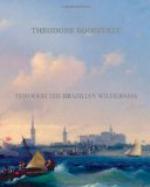IV. The headwaters of the Paraguay
At Corumba our entire party, and all their belongings, came aboard our good little river boat, the Nyoac. Christmas Day saw us making our way steadily up-stream against the strong current, and between the green and beautiful banks of the upper Paraguay. The shallow little steamer was jammed with men, dogs, rifles, partially cured skins, boxes of provisions, ammunition, tools, and photographic supplies, bags containing tents, cots, bedding, and clothes, saddles, hammocks, and the other necessaries for a trip through the “great wilderness,” the “Matto Grosso” of western Brazil.
It was a brilliantly clear day, and, although of course in that latitude and at that season the heat was intense later on, it was cool and pleasant in the early morning. We sat on the forward deck, admiring the trees on the brink of the sheer river banks, the lush, rank grass of the marshes, and the many water-birds. The two pilots, one black and one white, stood at the wheel. Colonel Rondon read Thomas a Kempis. Kermit, Cherrie, and Miller squatted outside the railing on the deck over one paddle-wheel and put the final touches on the jaguar skins. Fiala satisfied himself that the boxes and bags were in place. It was probable that hardship lay in the future; but the day was our own, and the day was pleasant. In the evening the after-deck, open all around, where we dined, was decorated with green boughs and rushes, and we drank the health of the President of the United States and of the President of Brazil.
Now and then we passed little ranches on the river’s edge. This is a fertile land, pleasant to live in, and any settler who is willing to work can earn his living. There are mines; there is water-power; there is abundance of rich soil. The country will soon be opened by rail. It offers a fine field for immigration and for agricultural, mining, and business development; and it has a great future.
Cherrie and Miller had secured a little owl a month before in the Chaco, and it was travelling with them in a basket. It was a dear little bird, very tame and affectionate. It liked to be handled and petted; and when Miller, its especial protector, came into the cabin, it would make queer little noises as a signal that it wished to be taken up and perched on his hand. Cherrie and Miller had trapped many mammals. Among them was a tayra weasel, whitish above and black below, as big and blood-thirsty as a fisher-martin; and a tiny opossum no bigger than a mouse. They had taken four species of opossum, but they had not found the curious water-opossum which they had obtained on the rivers flowing into the Caribbean Sea. This opossum, which is black and white, swims in the streams like a muskrat or otter, catching fish and living in burrows which open under water. Miller and Cherrie were puzzled to know why the young throve, leading such an existence of constant immersion; one of them once found a female swimming and diving freely with four quite well-grown young in her pouch.




